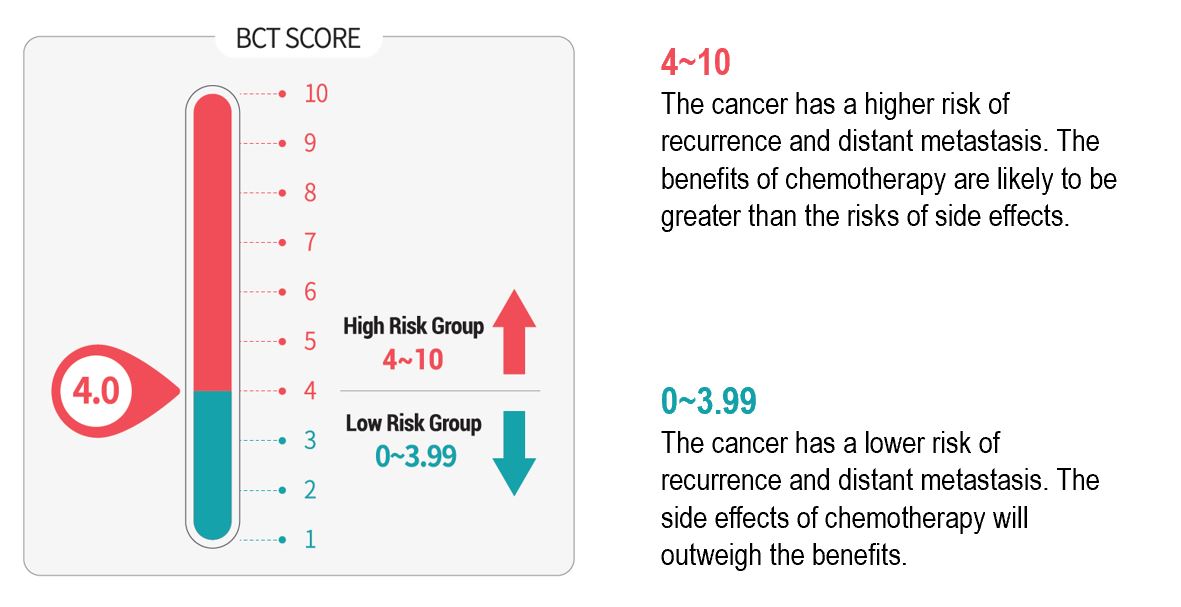Useful Informations
GenesWell BCT, A New Multigene Test for Early-Stage Breast Cancer

Precision Medicine for Breast Cancer
Breast cancer refers to a mass consisting of cancerous cells that originate in the breast, and it is generally categorized according to the type of cancer cells and the extent of invasion. In particular, the criteria for stage classification to predict the outcome of breast cancer treatment are tumor size, lymph node metastasis, and metastasis to other organs. Hormone receptors (estrogen receptors, progesterone receptors; ER, PR) and human epidermal growth factor receptor (HER2) play an important role in determining prognosis and treatment.
Although 70-80% of early stage breast cancer patients who are HR-positive and HER2-negative with metastasis involving fewer than three lymph nodes have a very low probability of distant metastasis, conventional breast cancer guidelines recommend postoperative chemotherapy for most patients. Many patients with early stage breast cancer are being prescribed chemotherapy and radiation therapy after surgery because their doctors have no way to predict the likelihood of recurrence or metastasis in other organs.
 What is?
What is?
 (Breast Cancer Test) is a multigene test to predict possibility of distant metastasis within 10 years after surgery and chemotherapy benefit for early-stage breast cancer patients who have hormone receptor positive (ER/PR+) and human epidermal growth factor receptor negative (HER2-) with fewer than 3 positive lymph nodes and who did not receive preoperative chemotherapy. The test differentiates between low-risk patients with high survival rate without chemotherapy and high-risk patients with low survival rate without
(Breast Cancer Test) is a multigene test to predict possibility of distant metastasis within 10 years after surgery and chemotherapy benefit for early-stage breast cancer patients who have hormone receptor positive (ER/PR+) and human epidermal growth factor receptor negative (HER2-) with fewer than 3 positive lymph nodes and who did not receive preoperative chemotherapy. The test differentiates between low-risk patients with high survival rate without chemotherapy and high-risk patients with low survival rate without
chemotherapy by providing a forecast for probability of distant metastasis and ten-year survival rate by analyzing RNA extracted from early breast cancer patients.
 is the first prognostic test of breast cancer in Korea only approved (Class III) by Ministry of Food and Drug Safety on 2 November 2016.
is the first prognostic test of breast cancer in Korea only approved (Class III) by Ministry of Food and Drug Safety on 2 November 2016.
Check Breast Cancer Stage
early-stage breast cancer, stage I and II
Check hormone receptor status
Hormone receptor positive
The hypersecretion of estrogen* and progesterone** can stimulate cancer cell growth. The hormone receptor positive patients take hormone therapy to control cancer cell growth.
* ER: Estrogen
** PR: Progesterone
If either of these hormone receptors is positive, then it is hormone receptor positive breast cancer.
Check HER2 status
HER2 negative
High levels of HER2 are linked to a greater likelihood of metastasis and relapse and an overall decrease in patient survival. HER2 positive patients receive targeted therapy.
GenesWell BCT is for HER2 negative breast cancer.
Check positive lymph nodes
Fewer than three positive lymph nodes
GenesWell BCT is for early-stage breast cancer patients with fewer than three positive lymph nodes.
* pN0: No positive lymph node
** pN1: 1~3 positive lymph nodes
 Report
Report
 derives the BCT score from a proven algorithm and provides a GenesWell™ BCT report that contains the final result.
derives the BCT score from a proven algorithm and provides a GenesWell™ BCT report that contains the final result.
The expression level of the nine  genes in a patient's specimen is measured through RT-qPCR and this is combined with his/her clinical information. This data is then computed by an exclusive Gencurix algorithm with its significance statistically proven, and ultimately
genes in a patient's specimen is measured through RT-qPCR and this is combined with his/her clinical information. This data is then computed by an exclusive Gencurix algorithm with its significance statistically proven, and ultimately  derives the BCT Score for the patient’s ten-year probability of distant metastasis.
derives the BCT Score for the patient’s ten-year probability of distant metastasis.
Depending on  score which is represented by a number from 0 to 10, patients are classified into HIGH or LOW risk group for distant metastasis. Low risk means that a patient would have higher survival rate without chemotherapy. On the other hand, high risk would mean that the cancer has higher chance of recurrence and thereby additional treatment may be necessary in order to increase the survival rate.
score which is represented by a number from 0 to 10, patients are classified into HIGH or LOW risk group for distant metastasis. Low risk means that a patient would have higher survival rate without chemotherapy. On the other hand, high risk would mean that the cancer has higher chance of recurrence and thereby additional treatment may be necessary in order to increase the survival rate.






